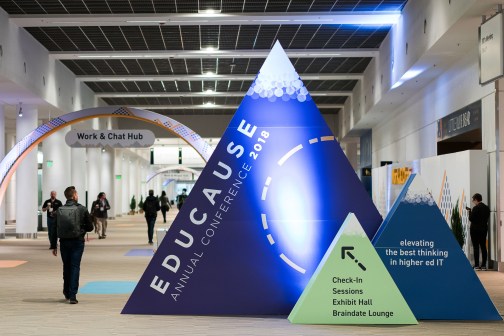Cultural transformation needed to accelerate edtech on campus – Horizon report

Advancing progressive technology approaches in higher ed will require cultural transformation on U.S. campuses — including more innovative, creative and entrepreneurial thinking — according to the latest NMC Horizon Report from the New Media Consortium and the EDUCAUSE Learning Initiative.
“NMC Horizon Report: 2017 Higher Education Edition,” released this week at the ELI annual conference, examines the trends and developments that will drive technology adoption and educational change over the next five years for higher education institutions based on input from 78 education and technology experts from 22 countries on five continents..
Creating “cultures of innovation” is one of the principal messages in the 53-page report, which provides a technology planning guide for educators, leaders, administrators, policymakers and technologists in the higher education sector. Divided into three sections, the report covers key trends accelerating technology adoption, major challenges impeding technology adoption and important developments in educational technology.
Each section explores in detail six topics that are relevant to technology adoption, challenges and technological developments, amounting to 18 crucial areas that demand the attention of campus stakeholders.
For example, the report explores entrepreneurship as a critical component of an innovative campus culture that advances technology adoption over the long term. “The act of integrating entrepreneurship into higher education further acknowledges that every big idea has to start somewhere, and students and faculty can be equipped with the tools needed to spark real progress,” the report suggested. In addition, project-based learning, challenge-based learning, inquiry-based learning, and similar methods are fostering more active learning experiences also are part of long-term technology adoption.
The report also explores how the blending of online and face-to-face learning will accelerate technology adoption. “Drawing from best practices in both online and face-to-face methods, blended learning is on the rise at colleges and universities as the number of digital learning platforms and ways to leverage them for educational purposes continues to expand,” the report states.
Among the challenges to technology adoption are those that are solvable, those that are more difficult and elusive and those that are “wicked” hard. Improving digital literacy is a solvable challenge, according to the report, while reaching digital equity, or equal access to technology, particularly broadband internet, may prove more difficult.
A more “wicked” hurdle is what the report terms “knowledge obsolescence,” or keeping up in a world where technology is advancing at a “strenuous” rate. “New developments in technology hold great potential for improving the quality of learning and operations,” the report states. “However, just as faculty and staff are able to master one technology, it seems a new version launches.”
Institutions must adopt processes for grappling with the rapid advances in technology and devise back-up plans before making large investments. They also must ensure that any tools selected are in service of deepening learning outcomes in ways that are measurable, according to the report.
Among the developments in the educational technology, the report highlights adaptive learning technologies and mobile learning as near-term adoptions, while the Internet of Things, virtual learning environments, artificial intelligence and natural user interfaces have adoption horizons of two-to-five years.
The authors also identified “big-picture” themes that underpin the topics addressed in the report. Among the themes are:
- Cultural transformation. Institutions must be structured in ways that promote the exchange of fresh ideas, identify successful models within and outside of the campus and reward innovation in teaching—with student success at the center.
- Real-world skills. Institutions have a responsibility to deliver deeper learning experiences and skills-based training that integrate technology to bolster post-graduation employability and workplace development.
- Collaboration. Institutions and educators can make more progress by learning from each other through the creation of communities of practice, multidisciplinary leadership groups and open social networks.
- Equal access. Despite the proliferation of technology and online learning materials, student access is still unequal. Gaps persist across the world based on socioeconomic status, race, ethnicity and gender.
- Learning metrics. Leaders must consider how to evaluate the acquisition of vocational skills, competencies, creativity and critical thinking.
- Digital fluency. Training must go beyond gaining isolated technology skills toward generating a deeper understanding of digital environments.
- Online, mobile and blended learning. If institutions don’t already have robust strategies for integrating these now-pervasive approaches, they will not survive.
- Agile learning ecosystems. All the components of the learning experience must be agile enough to support practices of the future.
- Incubating intuitive computers. As artificial intelligence and natural user interfaces tip into the mainstream, universities are at the forefront of designing machine-learning algorithms and haptic devices that more authentically respond to human interaction.
- Lifelong learning. Institutions must prioritize and recognize ongoing learning, which is the lifeblood of higher education.
Read: 16 issues driving higher education’s approach to teaching and learning, also released at the ELI conference.




